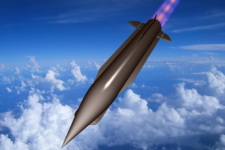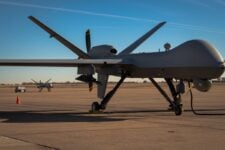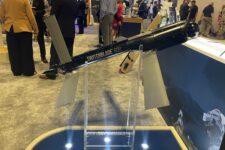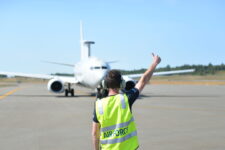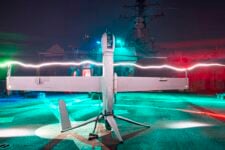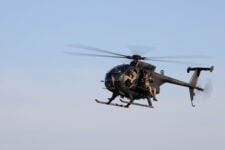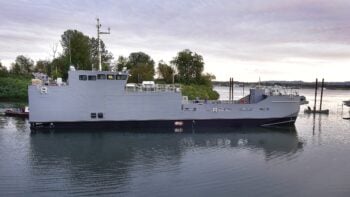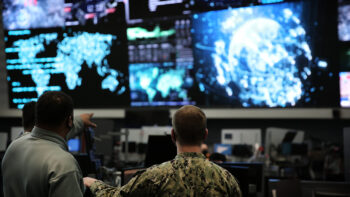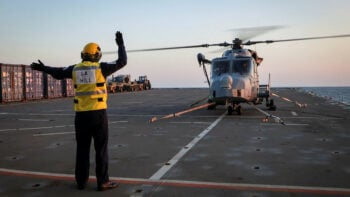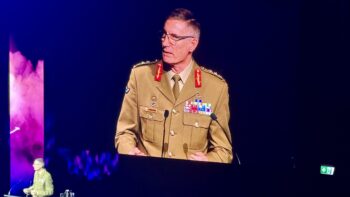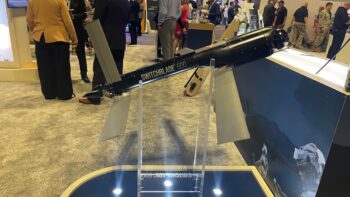
Defense Space Domain at Saudi Ministry of Defense stand in World Defense Show 2024. (Agnes Helou / Breaking Defense)
BEIRUT — Saudi Arabia plans to merge its air and space forces into a single organization sometime this year, three Saudi military officials told Breaking Defense, in part of what experts say is an ambitious but ultimately long-term plan for the Kingdom to develop robust space-based defense capabilities.
While plans can always change, one of the Saudi Ministry of Defense officials — who like the others spoke with Breaking Defense on the condition of anonymity at the World Defense Show outside Riyadh earlier this year — said, “We need space for deterrence. In 2024, MoD will merge air and space forces to defend the assets it has.”
That MoD official, who was at the Saudi MoD’s defense space domain stand at the show, added that the Kingdom also has plans that include launching a “satellite to support military applications in the near future.”
The Kingdom of Saudi Arabia (KSA) reportedly announced its intention to join its air and space forces in May 2022, but has not publicly provided a timeline for the move. Photos on the public US military image database DVIDS show US Air Force officials met with their Saudi counterparts at the Pentagon in October 2023 and “provided guidance to Saudi Arabian staff for the upcoming merger of the air force and air defense force into the Royal Saudi Air and Space Force.”
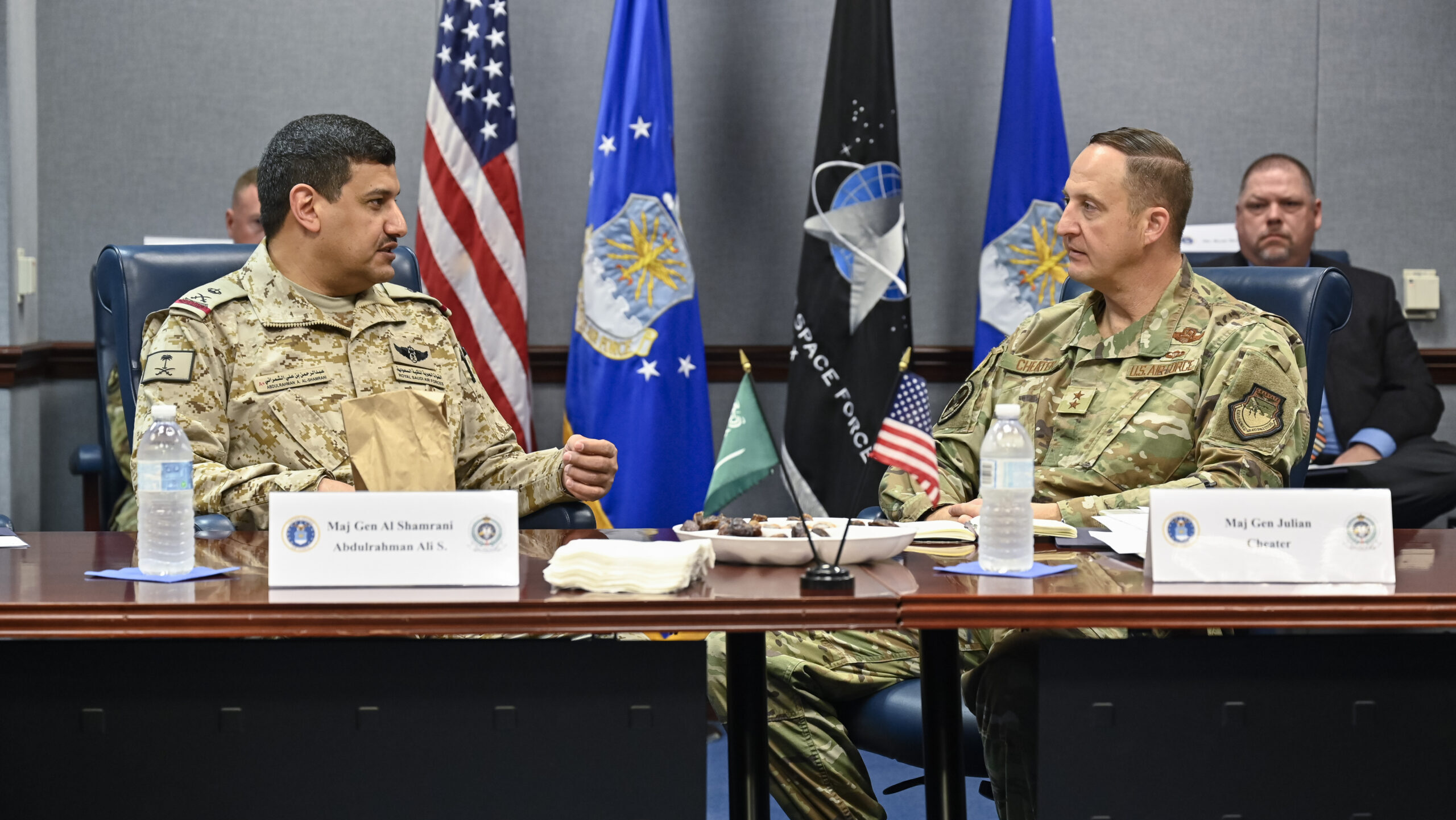
Maj. Gen. Abdulrahman Al-Shamrani, personnel chief for the Royal Saudi Air Forces, speaks with Maj. Gen. Julian Cheater, assistant deputy undersecretary of the Air Force for international affairs, during staff talks at the Pentagon, Arlington, Va., Oct. 30, 2023. U.S. Air Force staff provided guidance to Saudi Arabian staff for the upcoming merger of the air force and air defense force into the Royal Saudi Air and Space Force. (U.S. Air Force photo by Eric Dietrich)
The Saudi Ministry of Defense did not respond to Breaking Defense’s emailed request for additional comment, nor did the office of the US Air Force officials at the October meeting.
The merger, experts said, is an early step on a long road.
“Space is mostly aspirational for KSA. They are producing a space strategy which will look at defense and tourism applications, but there is very little in place now and this won’t be militarily significant for some time,” David Des Roches, associate professor at the Near East South Asia Center for Security Studies, told Breaking Defense. Des Roches noted that even the term “space force” for KSA is a bit of a misnomer right now, as the country currently has “nascent space domain awareness capabilities with the Air Force.”
Similarly, a regional space expert said the Saudi military “is serious about space, but currently has no capability and no organizational capacity apart from a small group of officers led by a two-star charged with figuring it all out.
“The Saudis are working with US advisors on the matter, and have been cultivating relations with US Space Command,” said the expert. “In the coming years the idea is that the RSAF [Royal Saudi Air Force] will transition to the Royal Saudi Air and Space Force.”
A Ways Away From Liftoff
While the Saudi sources indicated the organizational merger was closer than “the coming years,” it’s one that has taken on more urgency since the recent unrest in the region.
In 2018, the Kingdom made initial space strides by founding Saudi Space Commission, which later became the Saudi Space Agency, SSA, in charge of civil space matters. In May 2023 the Kingdom launched the first Saudi mission to the International Space Station. In June 2023 the Saudi government expanded the SSA’s remit further.
Amid the SSA moves, in May 2022, Saudi officials announced the plan for form an Air and Space Force.
Then, just last month, the KSA’s minister of communications and information technology reportedly announced that the Kingdom was working on a national space strategy, described largely in civilian terms.
Clayton Swope, deputy director of the aerospace security project at the Center for Strategic and International Studies (CSIS) in Washington, DC, said that strategy “might shed more light on timelines for plans regarding space security.
“What is clear now is that there is interest in space security, and that is probably driven by a recognition that Saudi Arabia has interests in space that it needs to protect and also the value of space across joint military operations,” he said.
The regional space expert, who requested anonymity due to sensitivities in KSA, said there is a “broad understanding in the Kingdom about its milspace requirements, namely space-based ISR (optical, SAR, RF Geolocation) and SATCOM, with everything else such [as] PNT and missile early warning being provided by the US.” Those acronyms refer to intelligence, surveillance and reconnaissance; synthetic aperture radar; radio frequency; satellite communications; and position, navigation and timing, respectively.
He added that Saudis are still figuring things out regarding organizational structure, but that due to troubles replicating US structure, KSA will likely “end up modeling their organizational approach along UK, French lines.”
“In other words, they have a long road ahead,” he said.
Another expert, who also requested anonymity, said he would be surprised if KSA stands up any new organizational structure before 2025 at the earliest. But there is reason for the Kingdom to hurry.
Regional conflicts, especially the recent Gaza conflict that broke out in October 2023, have shown the necessity for space-linked applications, from navigation that is subject to jamming in the Middle East to satellite control of unmanned systems heavily deployed in the region.
“We need space for deterrence,” one of the MoD officials at the World Defense Show said, adding KSA plans to “expand” its capabilities “to eliminate [related] challenges.”
“Saudi Arabia is not alone in placing a new focus on not just space, but space security specifically,” Swope said. “A number of countries over the last few years have reorganized or optimized their military organizations to better address space. This includes Japan, South Korea, and Australia. Also, the UK established a Space Command in 2021 and the US set up the Space Force in 2019. All of this in the last five years.”
Swope especially highlighted Saudi Arabia’s partnership with the US when it comes to space.
“On space, Saudi Arabia is a signatory of the US-led Artemis Accords, for example. The US Space Force has said partnerships with allies is one of its top priorities, specifically noting that allies in the Middle East have expressed interest in their own space forces,” Swope said.
Breaking Defense’s Theresa Hitchens contributed reporting from Washington, D.C.


